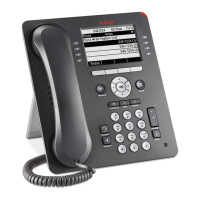Network Requirements
30 Deskphone SIP 9608, 9611G, 9621G, 9641G Administrator Guide Release 6.0.1
Server requirements
The following server types can be configured for the 9600 Series IP Telephones:
●
DHCP server
●
HTTP or HTTPS server
●
SIP Proxy (controller) or Registration server
●
Network Time Protocol server for SNTP
●
SES/SM SIP Proxy Server (controller) to be used as a gateway for survivability
●
System Manager
●
Communication Manager
●
Presence server
Note:
Note:
9600 Series SIP IP Telephones need SIP Enablement Services (SES) or Avaya
Aura
®
Session Manager (SM) to work properly. The SIP Proxy and Registration
servers reside on the SES/SM server. Avaya Aura
®
Communication Manager
(CM) is considered a “feature server” behind SES/SM that provides Outboard
Proxy SIP (OPS) features.
While the servers listed provide different functions that relate to the 9600 Series IP Telephones,
they are not necessarily different boxes. For example, DHCP provides network information
whereas HTTP provides configuration and application file management, yet both functions can
co-exist on one hardware unit. Any standards-based server is recommended.
For parameters related to Avaya Communication Manager information, see Chapter 4:
Avaya
Aura
®
Communication Manager Administration. For parameters related to DHCP and file
servers, see Chapter 6:
Server Administration.
!
Important:
Important:
The deskphones obtain important information from the upgrade files on the
server(s) and depend on the application file for software upgrades. If these
servers are unavailable when the deskphones reset, the deskphones will not
operate properly. Some features might not be available. To restore them you
need to reset the deskphone(s) when the file server is available.
DHCP server
Avaya recommends that a DHCP server be installed and that static addressing be avoided.
Install the DHCP server and application as described in Administering the DHCP and File
Servers on page 63.

